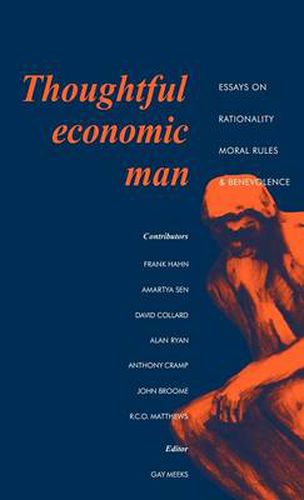Readings Newsletter
Become a Readings Member to make your shopping experience even easier.
Sign in or sign up for free!
You’re not far away from qualifying for FREE standard shipping within Australia
You’ve qualified for FREE standard shipping within Australia
The cart is loading…






This collection of essays by celebrated authors centres on ideas of rationality and morality in economics. The themes the essays cover are fundamental to economics: the influence of benevolence, altruism, justice and religious principles in our treatment of others in society; and the bases of rationality in decision making under conditions of uncertainty. These common themes are given a wide range of perspectives by the contributors, who discuss whether not just a ‘rational’ but also a ‘thoughtful’ economic man can be fitted into a sophisticated version of the orthodox model of man as a self-interested maximizer, or whether a radical upheaval in economic analysis is needed to accommodate him. The book is an examination by leading authorities of not only the role of rationality and morals in economics, but also the implications of conventional conceptions of rational economic man for all economic study. It constitutes a powerful argument for greater richness and subtlety in ideas about the motivations of individuals in their economic behaviour.
$9.00 standard shipping within Australia
FREE standard shipping within Australia for orders over $100.00
Express & International shipping calculated at checkout
This collection of essays by celebrated authors centres on ideas of rationality and morality in economics. The themes the essays cover are fundamental to economics: the influence of benevolence, altruism, justice and religious principles in our treatment of others in society; and the bases of rationality in decision making under conditions of uncertainty. These common themes are given a wide range of perspectives by the contributors, who discuss whether not just a ‘rational’ but also a ‘thoughtful’ economic man can be fitted into a sophisticated version of the orthodox model of man as a self-interested maximizer, or whether a radical upheaval in economic analysis is needed to accommodate him. The book is an examination by leading authorities of not only the role of rationality and morals in economics, but also the implications of conventional conceptions of rational economic man for all economic study. It constitutes a powerful argument for greater richness and subtlety in ideas about the motivations of individuals in their economic behaviour.